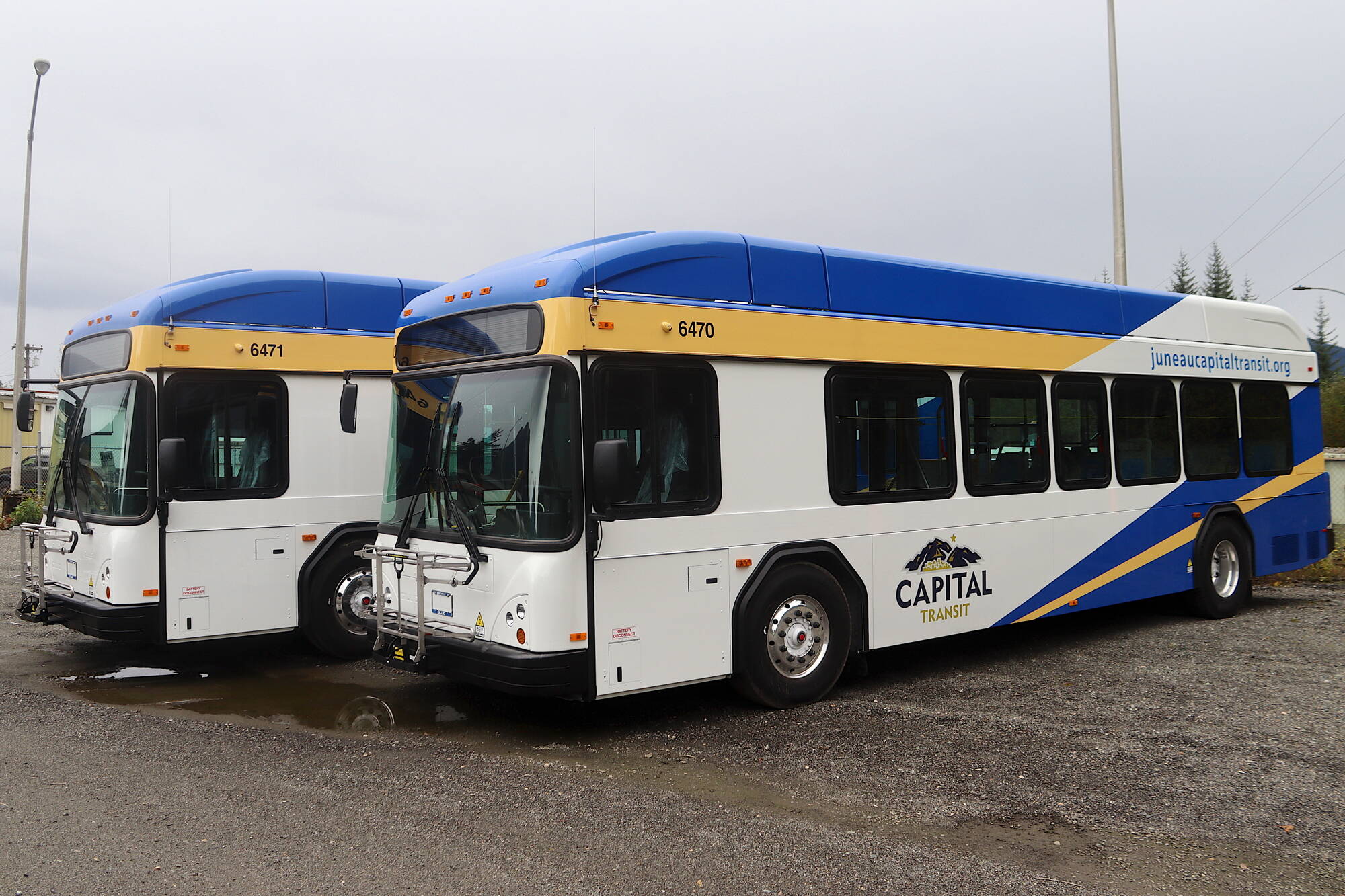Rich Ross knows some people will need convincing the city’s newly arriving electric buses are worthwhile since they’re parked at the opposite end of a lot from a previous model that hasn’t moved in nearly two years.
But the Capital Transit superintendent said Monday the seven new buses are from a different manufacturer with a much longer operating history than the company that supplied the first bus, and transit officials he’s talked to in other cities that made a similar switch are reporting favorable results.
The first two electric buses by California-based Gillig, a company founded in 1890 that built the diesel-powered buses currently used by Capital Transit, were parked at Capital Transit’s bus barn on Monday. Ross said the remaining five should arrive by mid-October and the electric fleet should be in service by about the beginning of the new year.
A series of steps are needed before the buses are ready including a delivery inspection by the manufacturer to ensure they arrived in suitable condition, outfitting them with equipment such as radios, installing additional chargers at the bus barn and Valley Transit Center, and ensuring drivers and maintenance workers are familiar with the new vehicles, Ross said.
“There’s going to be a few months where we’re really going to go over these things with a fine-tooth comb before we accept the buses and pay for them from the manufacturer,” he said. “It’s also going to take some time to get our staff through the maintenance training on these high-voltage systems and operator training as well. They drive a little bit differently than your conventional diesel bus, especially at low speeds. So I think it’s going to line up pretty well. We should have the charging infrastructure here at the barn about the time we’re ready to put them in revenue service.”
The first electric bus purchased by the City and Borough of Juneau has become an object of ridicule, although it did achieve a milestone as the first in Alaska that was owned and operated by a public transit agency. It began operating in the spring of 2021, but was frequently out of service due to mechanical issues that were complicated by manufacturer Proterra Inc., a company founded in 2004, filing for bankruptcy in 2023. It has been parked at the bus barn’s outside lot since November of 2022.
CBJ opted to purchase the Proterra bus because it “had the largest battery capacity of any of the bus manufacturers,” Ross said. The bus was funded primarily through a Federal Transit Administration (FTA) grant, with the remainder from a settlement fund managed by the Alaska Energy Authority.
The new fleet of seven buses has about a $13.3 million price tag for the vehicles and charging infrastructure, Ross said. Of that $10.1 million is from the FTA.
CBJ leaders have been planning in recent years to replace seven diesel buses manufactured in 2010, since they are near the end of their useful life, as part of a longer-term city goal of using 80% renewable energy by 2045. Ross said officials began looking for a different company to supply the new buses after grant funding for them was approved in 2022, given the problems with the Proterra bus.
“We reached out to multiple transit agencies,” he said. “Missoula, Montana, has some of these Gilligs. They got Gilligs after they had got Proterras and they’re also trying a different brand…just to see which one’s best. But I also noticed they had (Gilligs) in Everett, Washington. I was down there for something else and so I swung into their shop and made some contacts there, and they really like them and they’ve been reporting far less issues than with the Proterra busses.”
While battery capacity was a primary consideration with the Proterra bus, the newer Gilligs purchased by Capital Transit “have about double the capacity of the first bus we bought,” Ross said. He said their range appears to be 175 to 220 miles during Juneau’s winter and 300 to 360 miles during summer.
A Capital Transit bus on an eight-hour shift typically drives about 150 miles, while a 10-hour shift covers about 200 miles, he said.
The plan is to run the electric buses on all routes, without a definite indication whether they might be better suited for particular uses such as express or frequent-stop service, Ross said.
“They have regenerative braking and with the limited experience we have — we actually did get 30,000 miles on that Proterra — it actually seemed to get better mileage when it was doing stop-and-go stuff all the time,” he said.
The aging diesel buses being replaced on the roads will remain in Juneau for the time being, Ross said.
“We’re going to retain them — at least four of them — for right now because we’d like to bolster our summer service so we’re not leaving people behind,” he said.
There also is hope of moving the Proterra bus again — if a buyer can be found, Ross said.
“It’s been a long, slow process to either sell or dispose of that bus,” he said, adding the hope is to find a market in a place like California, which is phasing out all traditional-engine buses by 2030.
• Contact Mark Sabbatini at mark.sabbatini@juneauempire.com or (907) 957-2306.

